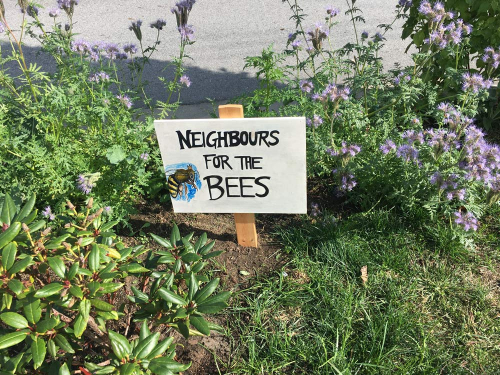Michael Pollan at UBC Farm
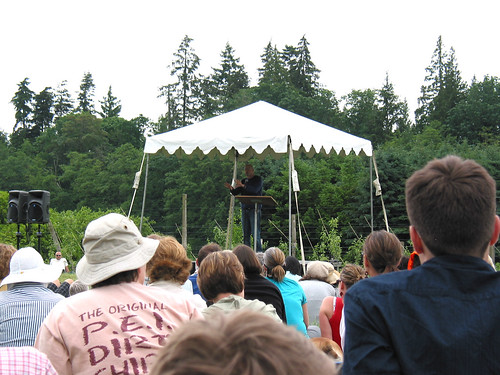
With lucky last-minute tickets, I attended an engaging talk by author Michael Pollan (The Omnivore’s Dilemma) at Vancouver’s spectacular UBC Farm this afternoon. This was his only Canadian stop on a book tour for the paperback edition of In Defense of Food: An Eater’s Manifesto (reviewed here earlier this week) and the location could not have been more appropriate. The afternoon included a quick farm tour after the talk, upon which I’ll touch later. It was cloudy for the talk, quite gladly, then the sun showed up afterward and made the place look like paradise! I enjoyed eating a yummy home-made salad and watching others eat around me. The event sold out all 670 tickets, and each person received a signed copy of the book.
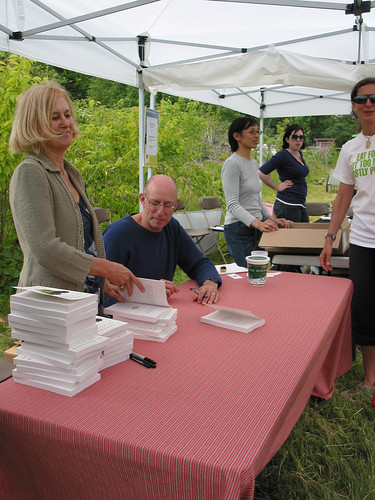
I actually stumbled into a media session yesterday at Barbara-Jo’s bookstore (they organized his appearance here; thank you!) where Pollan was answering questions and something he didn’t touch upon today was two reasons, aside from the usual money cost and time cost, that people buy processed food: 1) we hate throwing out food (processed food lasts a long time), 2) a (perceived) cleanliness factor, but it’s not actually healthier. I don’t recall those being mentioned in the book, but he only has so much room!
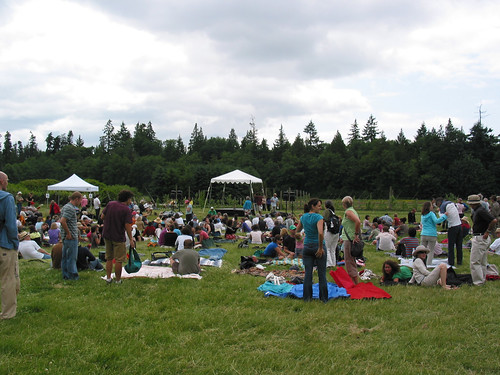
Giving a rundown of the four basic principles of nutritionism, he said that because it’s all about nutrients, which we can’t see or smell, we need scientists to tell us how to eat. Yet they really don’t know it all. He pointed out later, “It’s very hard to understand what’s going on deep in the soul of a carrot.”
He described eating the Western Diet as a spectrum between ruining your health and salvaging your health. He described the American way of eating as the American Paradox: we/they are more obsessed with healthy eating than anyone else (orthorexia) yet are the most unhealthy. The French Paradox, as it’s known, revolves around the somehow puzzling fact that the French eat tons of “saturated fat washed down with wine” and yet are healthier than Americans.
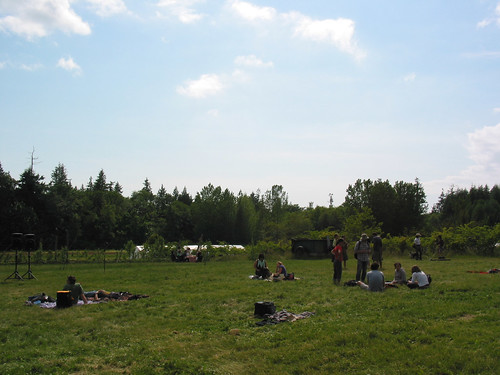
We have lost the tradition of breaking bread with friends — or enemies — and have become more concerned with the health aspect of eating. By forgetting the other, non-biological reasons for eating — pleasure, community, identity, culture, etc. — and obsessing instead and only over health, we’ve actually become a lot more unhealthy.
By operating with a division of nutrients into “satanic nutrients” and “blessed nutrients” (he’s hilarious), we end up replacing an “evil” nutrient with another one which becomes exonerated; for example, replacing fat with carbohydrates. Well we know how that turned out. Pollan said people thought if one low fat Snackwell was good for you, a whole lot of it must be better. (Ha!)
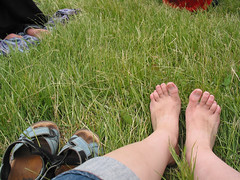
Other interesting tidbits:
– About 40% of cancer is linked to diet
– We’ve known about the Western Diet’s relationship to chronic diseases for 40 years but no one talks about it.
– Humans have and still do thrive on many, many different diets, yet the one diet that makes us undeniably sick is the one most of us are eating (the Western Diet). Some achievement it was for a civilization to invent “the diet that kills it.”
– Solutions? We need to stop talking about cholesterol and antioxidants, and start talking about whole foods. And ignore food journalists — after today, he joked.
– Don’t buy products that contain things you wouldn’t have in your pantry, such as high-fructose corn syrup: only the food industry cooks with that.
– Farmers get about 7–8% of the annual food spending in the US. The rest goes to food marketers, food scientists, packaging companies, etc. We’re talking hundreds of millions of dollars here.
– 10 calories of fossil fuel energy is needed to make 1 calorie of food, yet all calories come from the sun. We need to replace the fossil fuel energy with solar energy.
– We’re busily trying to feed our cars with corn because there is so much, we can’t eat all of it.
One person asked him, how do we get the food industry to change? “Vote with your fork, cook, and vote with your vote.” (You may recall Pollan’s open letter to the President-elect.)
Next time you’re at a supermarket, pay attention to how cold, sterile, and lifeless it is. Unlike a farmer’s market, you can’t smell or taste anything. The farmer’s market offers a much more sensory experience where you can sample food, “shake the hand that feeds you” and talk to other shoppers. Not to mention the fact that the food you buy there, which is more likely to be organic even if not certifed, actually HAS a scent!
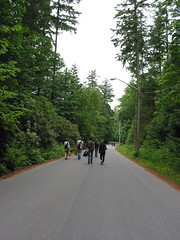 Probably the most relevant part of his talk, to me, was something I haven’t seen in the book. He advocated a diverse farming system, not just a locally-based one. By using different methods and systems — permaculture, biodynamic farming, urban agriculture, etc. — if one fails, we will still have food to eat. The current industrial agriculture system is destroying the natural system upon which it depends, and will fail. Make the food system as local as possible, but it’s not the only system. We need choices. (He basically validated my mostly-local-but-not-100% diet, which I thought encouraging.) He pointed out some areas no longer have the agricultural land they used to, and we must preserve what remains. (UBC Farm is the last farm in the city of Vancouver!) The other questions are, do we have enough farmland to feed everyone? Do we have enough farmers? He said we will need millions more people on the land when the oil runs out, so we must invest in education. In BC, most farmers are over 50, so we will soon find ourselves in desperate need for more farmers.
Probably the most relevant part of his talk, to me, was something I haven’t seen in the book. He advocated a diverse farming system, not just a locally-based one. By using different methods and systems — permaculture, biodynamic farming, urban agriculture, etc. — if one fails, we will still have food to eat. The current industrial agriculture system is destroying the natural system upon which it depends, and will fail. Make the food system as local as possible, but it’s not the only system. We need choices. (He basically validated my mostly-local-but-not-100% diet, which I thought encouraging.) He pointed out some areas no longer have the agricultural land they used to, and we must preserve what remains. (UBC Farm is the last farm in the city of Vancouver!) The other questions are, do we have enough farmland to feed everyone? Do we have enough farmers? He said we will need millions more people on the land when the oil runs out, so we must invest in education. In BC, most farmers are over 50, so we will soon find ourselves in desperate need for more farmers.
Quotes:
“I can’t think of any other species that needs writers to tell them how to eat.”
Nutritionism is America’s “biggest practical test and most abject failure.”
Marketing food to kids using toys (like McDonald’s) is “abhorrent.”
The 30-minute tour I was on was led by a graduate student who had worked very hard and passionately to develop an apple orchard on the farm. They have 70 varieties growing, yet only about 6 are sold in supermarkets when there are 7,500 varieties of apples worldwide! Apparently my success in growing an apple tree from seed that bore edible, palatable fruit was an incredibly lucky 1 in 20,000 chance. She felt sorry for me that it died, but encouraged me to plant the seeds from its apples, which I had saved.
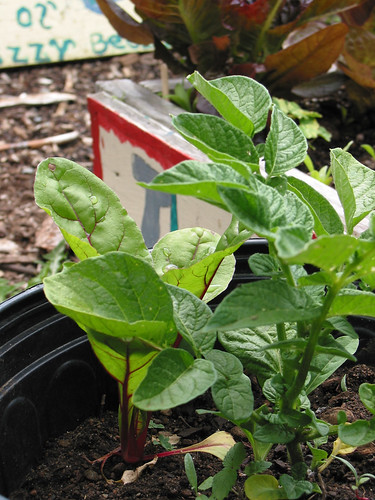
In the two months since my last visit, the children’s garden has sprung up in all its glory, with kale, Swiss chard, strawberries, beans, and many other delicious things. It’s wonderful that children are getting excited about growing vegetables. The summer camps fill up quickly (within 3 hours?) and the produce from UBC Farm gets people lined up early in the morning at their weekly market, which runs on Sundays til the fall. I hear the eggs and honey are heavenly.
The tour stopped at the hen pen, which had since moved, the Aboriginal Community Kitchen Gardens (amazing video) which now has a salmon smoking house to connect with healthy oceans, and beehives that help pollinate the farm.
It turns out the UBC Farm Trek had brought together three or four musicians that were today playing songs by Beirut on accordion, flutes and violin with some foreign-language vocals. I stuck around to enjoy their performance while talking with a woman with whom I share a mutual friend, and who gave me a tour of East Van (including pointing out the large Strathcona garden) as she generously drove me home, nearby which I pointed out what happened to the community’s trees. So I’ve seen diverse and even unfamiliar neighbourhoods today. Driving down 16th Avenue at UBC and watching cyclists and hikers made me so eager to hop on my bike and get over there!
Visit the UBC Farm Blog to learn how you can help save this invaluable yet threatened source of local food and teaching facility from potential condo development.

More photos at Flickr. Roland Tanglao was there too and took fantastic shots of all the beautiful food I missed!

